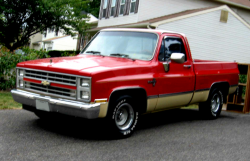— A General Motors C/K truck fire lawsuit is partially over as the judge ruled against the plaintiff concerning punitive damages, but a defective product claim remains in a Georgia court.
On January 27, 2015, plaintiff Kaitlyn Reichwaldt was driving a Ford Taurus in Nebraska when a 1984 General Motors C/K pickup truck spun out of control and crossed the median. The side of the C/K smashed into the front of the Taurus as the truck's gas tank was crushed against the steel frame of the truck.
Leaking gas caused both the C/K and the Ford Taurus to explode into flames. According to the lawsuit, the car was fully engulfed in flames because gas from the truck was spraying all over the Taurus. Reichwaldt suffered severe burns in the fire, a fire she says occurred only because of the defective design of the GM C/K truck.
The CK pickup, manufactured from 1973 until 1987, allegedly has an extremely dangerous design that uses side-saddle gas tanks that has caused fires, injuries and deaths for decades. GM allegedly wanted to advertise the C/K trucks as capable of holding up to 40 gallons of gas, so the trucks were built capable of holding two 20 gallon tanks mounted on the sides of the trucks.
According to the Center for Auto Safety, over 2,000 people were killed in fire crashes involving C/K trucks from 1973 through 2009. Hundreds of people have allegedly burned to death in C/K-related crashes that should have been survivable, and although the federal government told GM to recall the trucks years ago, the automaker refused.
Although GM said the trucks were safe and no recall would be issued, federal investigators said occupants in C/K trucks were up to six times more likely to burn to death in side-impact crashes compared to occupants in comparable trucks from other manufacturers.
The plaintiff says the gas tanks are mounted in the "crush zones" on the sides of the vehicles and outside the steel frame rails, leaving the tanks protected only by a pieces of sheet metal. According to the lawsuit, the location of the tanks present a "horrific" risk of fires occurring after side impacts, even in minor crashes.
A New York bankruptcy judge ruled GM's bankruptcy shielded the automaker from liability concerning punitive damages and told the plaintiff the only way she could seek punitive damages from New GM was to bring a claim based on conduct of New GM itself, not conduct of Old GM.
The plaintiff amended the lawsuit in a effort to get past the bankruptcy ruling and received the go-ahead from the judge by claiming New GM failed to warn about possible dangers of trucks made by Old GM. With the bankruptcy subject out of the way, the plaintiff needed to convince a Georgia judge that GM should have warned about the dangerous design of the trucks.
The plaintiff alleges Old GM failed in its duty to warn about the dangers of C/K trucks due to the location of the gas tanks and she argued New GM assumed liability for product liability claims against Old GM. Reichwaldt also claims Georgia law requires General Motors to warn "reasonably foreseeable third-party victims" about the dangers of the C/K truck.
However, General Motors told Judge Thomas W. Thrash that Georgia law does not recognize a duty to warn this particular plaintiff because she is neither the purchaser nor driver of the C/K truck. The automaker argues this leaves the plaintiff unable to state a claim for relief, and the judge agreed.
The judge referenced a decision by the Georgia Supreme Court that made a public policy determination in a separate case against imposing a duty to warn in situations such as this.
Next, Reichwaldt alleges a claim for failure to warn about the trucks based on the conduct of New GM. She further says New GM knew the C/K trucks were dangerous but chose not to warn about those dangers so the automaker could continue to make money from the trucks.
However, as the judge found in the previous claim, the duty to warn under Georgia law does not extend to Reichwaldt in this case because she was only one of the "countless third-party bystanders who could come into the vicinity of contact with the C/K truck."
The judge also dismissed the claim for punitive damages based on conduct of the New GM because the dismissal of the previous claims requires dismissal of a claim for punitive damages.
According to attorney Robert H. Snyder, Reichwaldt's hope is now with a claim against the automaker for compensatory damages for GM’s negligent design of the C/K trucks.
The General Motors C/K truck fire lawsuit was filed in the U.S. District Court for the Northern District of Georgia, Atlanta Division - Kaitlyn Reichwaldt v. General Motors LLC.
The plaintiff is represented by Butler Wooten & Peak LLP.
CarComplaints.com has complaints about the Chevrolet C/K 1500, Chevrolet C/K 2500 and Chevy C/K 3500.

